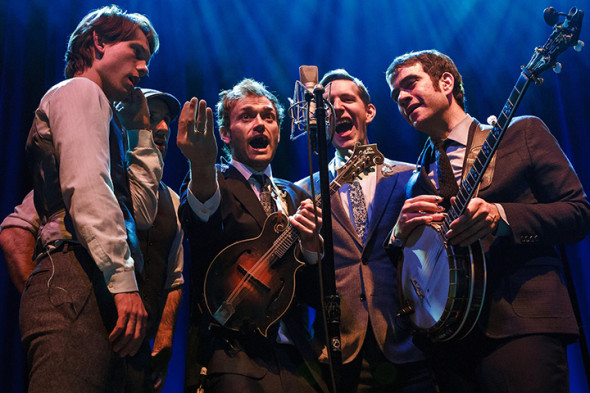
While Houston’s oil bust may be closing refineries, Punch Brothers brought the city some much needed musical refinement.
The placid Houston crowd didn’t quite know what to make of Punch Brothers opener Gabriel Kahane at first. The composer and singer-songwriter performed largely from his Los Angeles architectural concept album, The Ambassador, wisely choosing lighthearted and laugh-out-loud funny selections to warm the foreign crowd.
Though his music is technically serious, Kahane knew better than to take himself too seriously. He shmoozed onlookers with brainy charm, encouraging them to sing along to his tale of the post-apocalyptic studio wars in “Griffith Park,” and introducing “Villains” as a song “so fusty and pretentious that it needs a trashy drum beat.” The audience couldn’t help but laugh at “Neurotic and Lonely,” a song composed for classical vocalists based off of Craigslist ads for his 2006 album Craigslistlieder. Opening is never easy, but Kahane’s affable irony gave the show a memorable start.
At first, Punch Brothers didn’t bring a boot-stomping bluegrass honky-tonk to shake down the house. Songs like “My Oh My” and “This Girl” were crystalline, precise, and pretty like antebellum chantilly lace, but the crowd’s feet stayed firmly planted in the floorboards, and cheers were polite. Even the masterful ensemble performance of “Watch at Breakdown,” which featured the effortless stylings of banjoist Noam Pikelny and a defibrillating performance from violinist Gabe Witcher, failed to rouse much rabble.
These surgical moments seemed to be a conscious part of the show’s overall composition. Punch Brothers delivered more than mere technical perfection — they demonstrated tremendous musical range. Whether it was the chiming classical whimsy of Debussy’s “Passepied,” the frightful escalation of Josh Ritter’s haunting sea shanty “Another New World,” or the creepy cool acoustics of Radiohead’s “Kid A,” Punch Brothers proved that banjos and mandolins aren’t just meant for barn dances.
For Punch Brothers, bluegrass is a medium of musical expression — a preference, but not a requirement. Without stopping to breathe (or tune) after “Kid A,” the band dove into the frenetic pluckings of “Wayside — Back in Time,” a fast-paced duel between Pikelny and mandolinist Chris Thile. Even during straight country anthems like “The Bottom of the Glass,” the group interrupted Chris Eldridge’s heartsick singing with a classical interlude (complete with bow and everything) from bassist Paul Kowert. These transitions reminded the audience that rootsy Southern ditties about drinking away feelings aren’t all Punch Brothers have to play, but they really, really like to play them.
Perhaps the most memorable moment of the evening was when Punch Brothers put their instruments aside entirely. For “The Auld Triangle,” an a capella Irish prison ballad featured in the Coen Brothers 2013 film Inside Llewyn Davis, the band all stood encircled around a single retro microphone. As Thile led his fellow singers with a fetching Irish brogue, the tender silences of the dirge reverberated throughout the House of Blues with melancholy and meaning.
Punch Brothers represent a music genre that’s taking bows and backing behind the curtain. As tastemakers turn to the grungy spoken words of Kate Tempest and Courtney Barnett, or the discomfiting hip hop experiments of Kendrick Lamar and FKA Twiggs, your average guy with a beard, mandolin, and feelings doesn’t raise eyebrows or stir hearts anymore.
But Chris Thile isn’t your average guy with a mandolin, and Punch Brothers aren’t just bearded men with feelings. They’ll keep plucking at these strings as we fritter away with synthesizers for a decade or so, and when we need something expert, something earnest, they’ll be waiting for us.